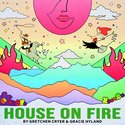|
Let's consider some cast recordings, including two now-closed musicals that ran briefly this calendar year on Broadway, both with considerable emphasis on women characters and females prominent on the creative teams. Their stories are set in California. Then there's a project from two writer-performers who are grandmother and granddaughter.
 REAL WOMEN HAVE CURVES REAL WOMEN HAVE CURVES
ORIGINAL [2025] BROADWAY CAST
Ghostlight Records
CD | Digital
Kinetic and earthy–with many of its overworked, frazzled characters filled with frustrations and family conflicts–Real Women Have Curves is nevertheless life-affirming. The likeably lively score is by Joy Huerta and Benjamin Velez, played with vigor by a nine-piece orchestra. As experienced on the Broadway cast recording, it's often brisk and boisterous, leavened by laments and longing. Songs put the spotlight on some simmering resentments and pressures, but things don't boil over to become sturm und drang-style accusations with blame and shame or an overdose of self-pity, although there are borderline moments. There's joy and a realistic acceptance of life that's not an easy ride. This story of immigrants working long hours in a dress-making factory, centering on one family from Mexico, has been previously told as a non-musical play and film. These folks make for good musical company even as they cavil or criticize each other.
Tatianna Córdoba, with a gratifyingly supple and sweet-toned voice, is cast as the central family's younger daughter, Ana, who has aspirations to attend college far from home and have a career as a writer. The singer-actress is winning throughout, whether singing of Ana's dreams or her growing appreciation for the sacrifices and struggles of her kinfolk and workmates. In a particularly cute number called "Already Know You," reveling in a mutual crush, she and Mason Reeves are delightful. As the older sister with her own "Daydream" of a different way of life, Florencia Cuenca evokes sympathy, as does Justina Machado as their burdened mother.
Many Spanish words and brief phrases are sprinkled into the otherwise English-language lyrics and bits of included dialog (by Lisa Loomer, with Nell Benjamin joining the writers after the Massachusetts premiere). The Spanish inclusions add color and personality and many are wisely limited to generally familiar words, have the equivalent English folded in, or the meanings can be guessed from context. The throb of Latin beats and caffeinated percussion in busy arrangements suit the very busy work atmosphere, and lyrics are replete with mentions of the toiling. "The grind don't stop/ Don't let the ball drop" the workers sing, rhythmically, in "Jugglin.'" Unlike songs in other musicals that can test one's attention span and interest by leaning heavily, unimaginatively, on much repetition of phrases in music and lyrics, that device is effective in these numbers where a line can become a mantra or approximate the pounding speed or relentless tedium of tasks in a factory. During "Make It Work," the laborers lament their lot, but there's also humor; a rejoinder to the complaint about the broken fan and the very hot room is the sarcastic "Think of it as a sauna," and the suggestion for alleviating leg cramps is "Try a little dancing." The title song is an invigorating, celebrational all-ages anthem for body positivity and survival ("No matter what life throws our way/ We can bend, we can dance, we can ricochet/ When la vida gets hard, we know what to say").
The CD comes with a booklet that includes 10 color photos of the production, a plot synopsis, short commentaries by the bookwriters, credits, and all the lyrics (and spoken lines) heard on the 17 tracks.
 REDWOOD REDWOOD
ORIGINAL [2025] BROADWAY CAST
Masterworks Broadway/ Sony
CD | Vinyl | Digital
The intention of seeking refuge or privacy in a tree, briefly or for an extended period, has been part of the plot of some musicals in the past (The Grass Harp, Prince of Central Park, Pacific Overtures, Camelot, Once on This Island, The Most Epic Birthday Party Ever). A recent Broadway entry, Redwood, takes such a residency and the requisite climbing to new heights in the tale of a New Yorker, Jesse, who comes to California and (hopefully) comes to terms with the death of her son. Some songs are powerhouse numbers while others have passages of poignancy. Topics covered include grief and the grandeur of the ancient, tall redwood trees in the forest. Thus, there's angst and awe, catharsis and communing with Nature demonstrated in the decidedly committed character work with contrasting vocal colors.
The female creative team consists of Kate Diaz (composer, co-lyricist, arranger, orchestrator), Tina Landau (co-lyricist, bookwriter, director, co-conceiver) and Idina Menzel, who plays Jesse, the project's co-conceiver, credited with "additional contributions." There are two other major female roles in the five-person cast: De'Adre Aziza as Mel, the woman Jesse is married to; and Khaila Wilcoxon, playing Becca, a tree scientist. Julie McBride is the conductor and plays keyboards in the orchestra. Two brief instrumentals that feel like bits of an atmospheric movie soundtrack are among the cast album's 19 tracks.
Redwood logged 110 performances on Broadway this year, following a 2024 production at the Jolla Playhouse in San Diego. The recording displays the story's conflicts, respect for Nature's majesty, lamenting, and sense of adventure. Pain is palpable, in both subtle and strident passages. While much of the score feels very pop/contemporary, conversational or confessional, when the subject at hand is the wonder of the survival of centuries-old, mammoth trees, songs and orchestrations can take on an appealingly timeless, folk-like feel or an air of mystery.
Idina Menzel's distinctive voice belting in full throttle produces an exciting thrill for some, while sounding shrill to others. Increasing intensity and big builds to musical/vocal explosions in several of her songs make sense in context; they are cued by her character being overwhelmed by mourning and memories or the exultation she finds in going higher and higher and the freedom of swinging in the air, with the help of the appropriate apparatus. But there is also respite from the throbbing sorrow and Nature-related jubilation. Especially impactful in that gentler category is the balm-like, pensive "Stars" ("Stars in their grace, peaceful and timeless, surround me here/ Make the memories disappear"). For vocal fireworks, try the reaction to "The Fires" that break out and could end any tranquility and calm. In "Becca's Song" Miss Wilcoxon's arborist references earlier blazes and earthquakes in San Francisco that informed her perspective and a desire to heal the world, noting that "From the ashes come rebirth."
Miss Aziza as Mel is effective and sympathetic, showing the audience two sides to the marital relationship that's become fragile and fraught due to tragedy and the physical and emotional distance between them. She has a song that admits fears and offers an apology. It's called "Looking Through This Lens"–which has a double meaning because the character is a photographer. Also in the category of comparisons, tree specialist Finn (in a sensitive interpretation by Michael Parks) sings of the special qualities of the "Roots" of redwoods: "extremely shallow ... spreading out, they're going in every direction ... And when they come to the roots of another tree, they intertwine ... And that is how the redwood's able to stand tall: It's being held up, and supported, by others." In case an audience might miss the implied analogy to humans needing a support system, the lyric soon expresses it in an on-the-nose declaration ("The trees' most important lesson is that, like the roots, we need connection").
In a theatrical dream sequence, in which the dead son appears, a posthumous lesson about life comes: a sage reminder about all the worthy things that "Still" can be enjoyed. "I stay alive in your memory," sings the compelling Zachary Noah Piser in this moving, major highlight. It kind of recalls "I'm Alive" in Next to Normal, which also considers the daunting task of moving on after a child dies.
Of course, the audio-only souvenir can't capture a real sense of the stage production's visual impact of immersive forest projections and the climactic climb (at different heights, swinging while singing). But some fans seeking to vicariously scale the heights of motion and emotion will find rewards in the Redwood recording.
 HOUSE ON FIRE HOUSE ON FIRE
PREMIERE RECORDING
Precious Days Records
Digital
During the many years Gretchen Cryer, as lyricist/bookwriter, had a collaboration with composer Nancy Ford, they were rarities: a female duo crafting musicals. Now Miss Cryer has paired with another woman, Gracie Hyland (sometimes billed as Grace or Gracie Lou Hyland), who just happens to be her granddaughter. Their musical, House on Fire, has debuted as a recording and in a one-night concert presentation in Manhattan. Billed as "a cautionary fairy tale," the story concerns people concerned (or not) with dangers to the environment. The often frisky score employs various musical styles and tones, which could make it feel a bit disjointed on first listening. But it achieves its goal of bringing attention to climate change, the hole in the ozone layer, pollution, dependence on fossil fuels for energy, and more. The message that responsible action is needed to address these issues comes through long before we get to the earnest, optimistic anthem-like statements in the group finale, a number stating that we're all "Connected at the Heart" ("We gotta trust each other, believe you're my brother, we gotta count on each other ..."). Other songs are lighter, and along the way we get some sly humor and quirky moments. Jody Shelton is the pianist/arranger and leads the band consisting of four other musicians.
Not all the songs were co-written by the two relatives for this new project. About 40 years ago, Gretchen Cryer had the idea to create a musical on these topics and crafted lyrics and music for two of the longest pieces that are here. She sings both herself, with keen concern in her voice: One is a direct plea to the "Captain of Industry" (the husband of the character she's ably playing here, with heart) and the other is "Precious Days" (which also gives a name to the record label). One of Gracie Hyland's releases as a singer-songwriter addressed the angst and apathy of those of her generation when they get to a certain age. The lyric of that rant, titled "Early 20s Crisis," is slightly tweaked to be reborn as "Early Teen Crisis" to be suitable as a solo for House on Fire's 13-year-old character (her role to sing on this studio cast recording), daughter of the aforementioned married couple. She has a peppy number about each new day having the potential to do something productive ("Wake Up, Shake Up").
The plot thickens as the teenager, becoming aware of endangered species, runs away from home to seek and/or save an endangered species of rhinoceroses. Then there's a likewise almost-extinct female giant condor who can save its species from dying out via its convenient ability to self-fertilize. How? Katerina The Condor explains it all, declaring "I Believe in Miracles." Gabriella Joy Rodriguez belts it out with panache as Katerina The Condor.
A rollicking, irreverent rejection of taking "Life" too seriously is shared by Michael McCorry Rose and Tyley Ross as, respectively, that husband whose company is not doing the environment any favors and the family's therapist. It's super-fun and catchy.
And what would a musical about our problem-plagued planet be without the character of Mother Earth? In this show, she's presented as a dominatrix, as Angela Birchett rounds out the cast. Note that some of these facts can't be gleaned just by listening to these tracks; there's not much dialogue and no digital booklet to give a synopsis.
The intention for the future is to offer presentations of House on Fire as fundraisers for environment-oriented organizations, so perhaps they'll be staged productions and concerts soon. It's an intriguing musical with its heart in the right place.
|
|